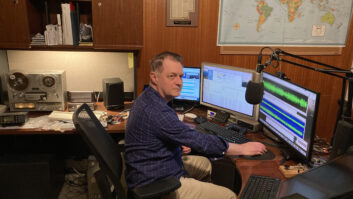Make it so!
Jun 1, 2001 12:00 PM, By Jim Paluzzi
While you attended the NAB, you kicked the tires and identified the purchases you want to make. What comes next? Cut the purchase order? Pull out the corporate purchasing card? How do you go from capital decision to capital execution? You must find a way to �make it so!� For many managers, deciding what to buy is the easy part of spending your capital budget. The hard part is deciding how to buy it.
There are many ways to make a purchase; knowing how to order can make the difference in truly adding value to your radio station. Purchasing errors are more than expensive; mistakes can result in lost productivity that hurts morale and the bottom line.
Take a look at your purchasing categories, ask yourself (and potential vendors) some questions, and you will likely experience the rewards of money well spent. Let’s discuss two types of high-ticket capital investments.
Physical plant
Building studios, transmitter buildings and towers is not the core business of most broadcasters. But management can be tempted to assign the task of designing and building technical facilities to the engineering department in an effort to save money. This is usually a mistake.
It may be better to delegate major construction projects to a general contractor or to a series of subcontractors that your engineering team can supervise. There are at least three reasons why it usually makes sense to outsource major capital projects.
Indirect costs. While your technical staff is probably more than capable of learning the construction trade, it will take time for your staff to master the learning curve. The costs of learning how to build something for the first time are often buried in the budget, since your staff gets paid anyway. You may never know the real cost of having your staff handle your physical plant projects.
The costs of ignorance. Few things can create as much grief in an organization as a capital project in trouble. It is safe to assume that mistakes will occur at the construction site; that is why it may be wise to outsource the heavy lifting to someone who does this work for a living. It all boils down to who pays for those mistakes.
On time, on budget. A general contractor or a subcontractor should have fewer responsibilities than your engineering staff. Before awarding a contract, see how many concurrent jobs the contractor has scheduled during your construction period. If the contractor is evasive on this issue, find another contractor.
The last thing you need is to pull your engineering team off a construction project to deal with a crisis.
Include penalties in your contract for failing to complete construction by a stated deadline. Penalties are your best insurance that a construction crew is going to stay on the job, even if your contractor has a more lucrative contract in the wings.
There is a middle ground between �doing it yourself� and hiring a general contractor: buying boxes instead of buildings. Increasingly, broadcasters are purchasing prefabricated studios and transmitter buildings, rather than �stick-building� their facilities. This allows broadcasters to take advantage of mass production cost savings � with the promise of greater quality control.
The advantages of prefabrication are magnified at public radio stations at state institutions, where studio facilities are often a neglected part of a much larger, multi-purpose building. The hazards of lowest-cost bidding, combined with the politics and bureaucracy that too often surround public works projects, conspire to ensure that many stick-built facilities will be inferior to their prefabricated counterparts.
Automation systems
Once considered a necessary evil at neglected sister stations, digital playback systems now deliver the pulse of most radio stations. While the process of selecting an automation system that is right for your station is a lot like buying a car, here are some purchasing tips that will serve you well before you buy:
Never buy based on a demo. Arguably, a vendor’s product demonstration represents that company’s best sales effort. On the other hand, your best predictor of how the system will work at your station will be your observation of how the product works in the field � without the vendor present. Find at least two installations of the proposed system at facilities similar to yours. Travel to those stations and spend a day talking with management, engineering and operations.
Ask to have several people demonstrate the system. If you hear frequent references to only one person at the station who �really knows how to make this thing work,� run away from the product. If the automation system is user-friendly, everyone should know how it works.
Visit the factory. To evaluate the quality of technical support you are going to receive after you purchase your system, head for the factory. Given investment cost of the system, vendors will be hard pressed to turn down your request for an on-site visit. Forget the multimedia presentations in the boardroom. Instead, head for the repair bench and talk to the technicians. Ask about the most common hardware problems they face.
Visit the help desk and ask the staff to describe the most common problems they encounter. Ask about the help desk tracking system. Any serious help desk operation has software that allows staff to document and track trouble calls. Finally, look for a help desk that has a high level of respect for the products they sell � and the users who buy those products.
Be careful with factory training programs. Staff members certainly need training on a new automation system. The question, however, is not whether your staff should be trained, but rather, �Who should train your staff?�
Factory trainers usually understand their equipment and their software, however, not all trainers have a background in station operations. Indeed, few trainers have any formal background in training. As a result, system training can be highly frustrating for the staff � and hardly worth the expense.
Instead, find a user who understands how the system works. Offer that person the money you would have spent on factory training. Then, you will have someone training your staff who can focus on the basics of how to get things working, rather than a technically thorough (but otherwise irrelevant) �systems overview.�
Capital investments will constitute a larger portion of a radio station’s budget in the decade ahead. Stations that establish effective procedures to execute capital purchases will receive an even greater return on their investment.
Jim Paluzzi, Ph. D., is general manager of Boise State Radio.












